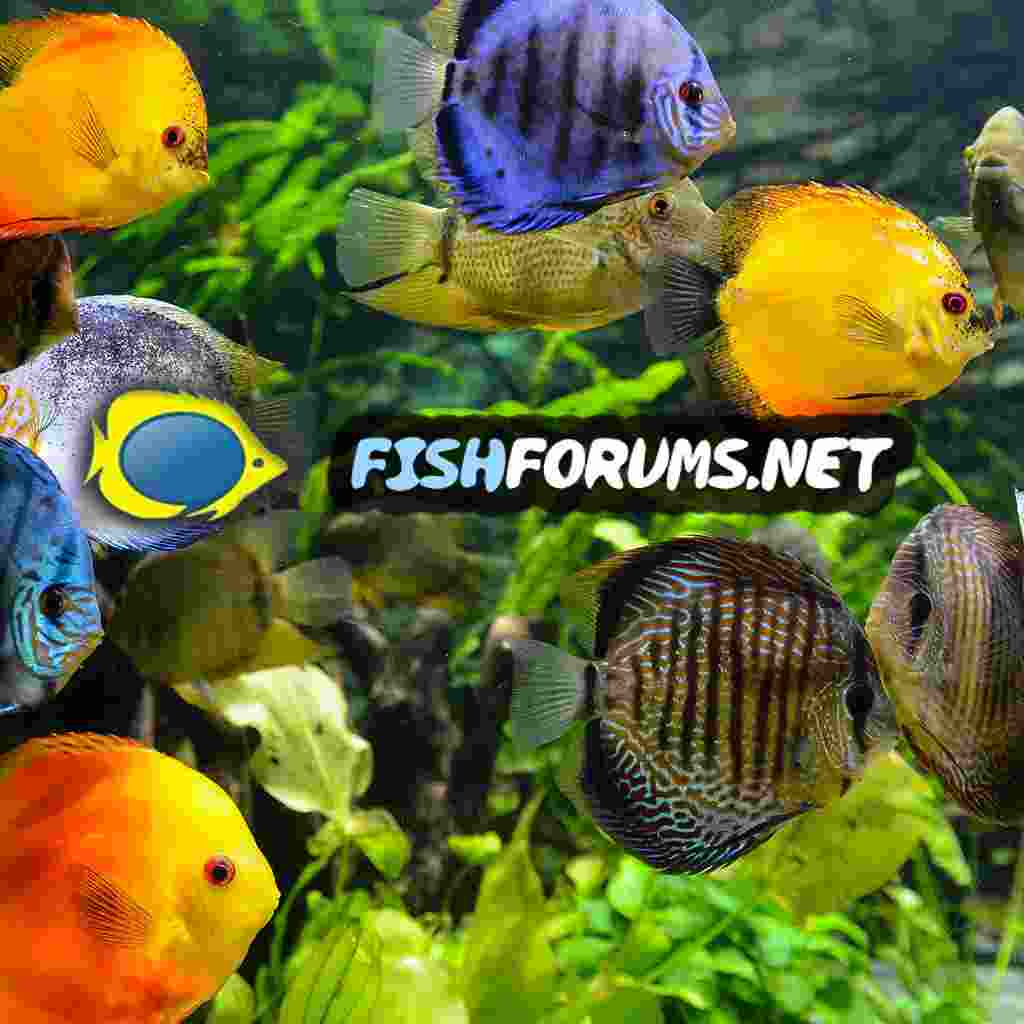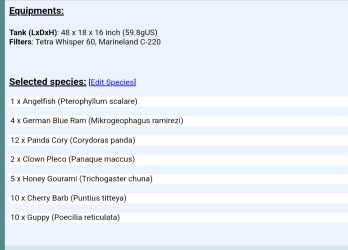🌟 Exclusive Amazon Black Friday Deals 2024 🌟
Don’t miss out on the best deals of the season! Shop now 🎁
You are using an out of date browser. It may not display this or other websites correctly.
You should upgrade or use an alternative browser.
You should upgrade or use an alternative browser.
How are we thinking about this for stocking?
- Thread starter ElmoTerminator
- Start date
What is the GH (general hardness), KH (carbonate hardness) and pH of your water supply?
This information can usually be obtained from your water supply company's website (Water Analysis Report) or by telephoning them. If they can't help you, take a glass full of tap water to the local pet shop and get them to test it for you. Write the results down (in numbers) when they do the tests. And ask them what the results are in (eg: ppm, dGH, or something else).
Depending on what the GH of your water is, will determine what fish you should keep.
Angelfish, discus, most tetras, most barbs, Bettas, gouramis, rasbora, Corydoras and small species of suckermouth catfish all occur in soft water (GH below 150ppm) and a pH below 7.0.
Livebearers (guppies, platies, swordtails, mollies), rainbowfish and goldfish occur in medium hard water with a GH around 200-250ppm and a pH above 7.0.
If you have very hard water (GH above 300ppm) then look at African Rift Lake cichlids, or use distilled or reverse osmosis water to reduce the GH and keep fishes from softer water.
----------------------
Might be too many bottom dwellers for 4 rams and 12 Corydoras. A pair of rams might be better but you can't always guarantee 2 make a pair. The best way to get a breeding pr of rams is to buy 8-10 young fish and grow them up together. Let them pr off naturally and move the prs into their own tanks.
Guppies are riddled with diseases like gill flukes, intestinal worms, and external bacterial & protozoan infections. If you get any, quarantine them for a month before adding to the main display tank.
Guppies prefer harder water compared to the other fish's you have so check the GH before getting any fish. Guppies can tolerate a GH down to about 150ppm but no lower. The other fishes occur in water with a GH lower than 150ppm so if the GH is low, then don't get guppies.
This information can usually be obtained from your water supply company's website (Water Analysis Report) or by telephoning them. If they can't help you, take a glass full of tap water to the local pet shop and get them to test it for you. Write the results down (in numbers) when they do the tests. And ask them what the results are in (eg: ppm, dGH, or something else).
Depending on what the GH of your water is, will determine what fish you should keep.
Angelfish, discus, most tetras, most barbs, Bettas, gouramis, rasbora, Corydoras and small species of suckermouth catfish all occur in soft water (GH below 150ppm) and a pH below 7.0.
Livebearers (guppies, platies, swordtails, mollies), rainbowfish and goldfish occur in medium hard water with a GH around 200-250ppm and a pH above 7.0.
If you have very hard water (GH above 300ppm) then look at African Rift Lake cichlids, or use distilled or reverse osmosis water to reduce the GH and keep fishes from softer water.
----------------------
Might be too many bottom dwellers for 4 rams and 12 Corydoras. A pair of rams might be better but you can't always guarantee 2 make a pair. The best way to get a breeding pr of rams is to buy 8-10 young fish and grow them up together. Let them pr off naturally and move the prs into their own tanks.
Guppies are riddled with diseases like gill flukes, intestinal worms, and external bacterial & protozoan infections. If you get any, quarantine them for a month before adding to the main display tank.
Guppies prefer harder water compared to the other fish's you have so check the GH before getting any fish. Guppies can tolerate a GH down to about 150ppm but no lower. The other fishes occur in water with a GH lower than 150ppm so if the GH is low, then don't get guppies.
55-60 what? You have to frame the question more clearly or we are just guessing. 60 embers or 60 oscars...
I think the op means water volume of 55-60 gallons when filled, including substrate/decor/plants etc?55-60 what? You have to frame the question more clearly or we are just guessing. 60 embers or 60 oscars...
Oops. or filter capacity? Filters rated for 55-60?I think the op means water volume of 55-60 gallons when filled, including substrate/decor/plants etc?
ElmoTerminator
New Member
55-60 what? You have to frame the question more clearly or we are just guessing. 60 embers or 60 oscars...
The filters are meant for 55 and 60 gallons respectively55-60 what? You have to frame the question more clearly or we are just guessing. 60 embers or 60 oscars...
ElmoTerminator
New Member
Yeah it's referring to to respective filter capacityOops. or filter capacity? Filters rated for 55-60?
ElmoTerminator
New Member
I would buy all of not at least a major majority of the fish in my area so they would all be extremely use to my areas water hardness which generally runs on the hard side. Ph is usually in the high 7'sWhat is the GH (general hardness), KH (carbonate hardness) and pH of your water supply?
This information can usually be obtained from your water supply company's website (Water Analysis Report) or by telephoning them. If they can't help you, take a glass full of tap water to the local pet shop and get them to test it for you. Write the results down (in numbers) when they do the tests. And ask them what the results are in (eg: ppm, dGH, or something else).
Depending on what the GH of your water is, will determine what fish you should keep.
Angelfish, discus, most tetras, most barbs, Bettas, gouramis, rasbora, Corydoras and small species of suckermouth catfish all occur in soft water (GH below 150ppm) and a pH below 7.0.
Livebearers (guppies, platies, swordtails, mollies), rainbowfish and goldfish occur in medium hard water with a GH around 200-250ppm and a pH above 7.0.
If you have very hard water (GH above 300ppm) then look at African Rift Lake cichlids, or use distilled or reverse osmosis water to reduce the GH and keep fishes from softer water.
----------------------
Might be too many bottom dwellers for 4 rams and 12 Corydoras. A pair of rams might be better but you can't always guarantee 2 make a pair. The best way to get a breeding pr of rams is to buy 8-10 young fish and grow them up together. Let them pr off naturally and move the prs into their own tanks.
Guppies are riddled with diseases like gill flukes, intestinal worms, and external bacterial & protozoan infections. If you get any, quarantine them for a month before adding to the main display tank.
Guppies prefer harder water compared to the other fish's you have so check the GH before getting any fish. Guppies can tolerate a GH down to about 150ppm but no lower. The other fishes occur in water with a GH lower than 150ppm so if the GH is low, then don't get guppies.
WhistlingBadger
Professional Cat Herder
Retired Moderator ⚒️
Tank of the Month 🏆
Fish of the Month 🌟
- Joined
- Dec 18, 2011
- Messages
- 7,014
- Reaction score
- 13,033
- Location
- Where the deer and the antelope play
I love your username. Elmo must die. 
I agree that you're planning to keep a lot of soft-water fish, and they might not thrive in your hard water. I always recommend choosing fish to suit the water you have, as it will save you and your fish a lot of trouble down the road. Soft-water fish can survive in hard water, but they won't thrive.
Fortunately, there are a lot of amazingly beautiful and interesting fish that would do well in your hardish water, and a 60 gallon tank is a great size to start out with--it isn't too big to manage, but it is big enough to give you some options. It would be helpful to get a specific hardness reading for your water. In the meantime, research rainbowfish, live-bearers, panda Garra, central American cichlids, and Lake Inle fish.

I agree that you're planning to keep a lot of soft-water fish, and they might not thrive in your hard water. I always recommend choosing fish to suit the water you have, as it will save you and your fish a lot of trouble down the road. Soft-water fish can survive in hard water, but they won't thrive.
Fortunately, there are a lot of amazingly beautiful and interesting fish that would do well in your hardish water, and a 60 gallon tank is a great size to start out with--it isn't too big to manage, but it is big enough to give you some options. It would be helpful to get a specific hardness reading for your water. In the meantime, research rainbowfish, live-bearers, panda Garra, central American cichlids, and Lake Inle fish.
The fish on your list may be kept in your water at the local store but that won't change how they evolved over millions of years. It is much better for the fish if you keep those which originate in water with similar hardness to your tap water.I would buy all of not at least a major majority of the fish in my area so they would all be extremely use to my areas water hardness which generally runs on the hard side. Ph is usually in the high 7's
ElmoTerminator
New Member
Fish are incredibly adaptive to a extent when it comes to water parameters. Given enough time they can survive in water that may be to hard/soft or to alkaline or acidic then where they commonly are. The waters where they come from fluctuate all the time. Water hardness can easily be bypassed as long as it's consistent during thier life.The fish on your list may be kept in your water at the local store but that won't change how they evolved over millions of years. It is much better for the fish if you keep those which originate in water with similar hardness to your tap water.
Byron was one of our most respected members who sadly passed away earlier this year. He was very knowledgeable having spent years in the hobby.
The first post in this thread explains why it is a myth that fish ca adapt to any hardness.

 www.fishforums.net
www.fishforums.net
The first post in this thread explains why it is a myth that fish ca adapt to any hardness.

Importance of GH over pH in Freshwater Fish Aquaria
In another thread, I was asked by @Uberhoust if I had scientific data to support my frequent advice that GH was the more important parameter when compared to pH [temperature is another critical parameter but outside this particular discussion], and rather than hijack that thread, perhaps start a...
 www.fishforums.net
www.fishforums.net
Similar threads
- Replies
- 7
- Views
- 264
- Replies
- 13
- Views
- 466


